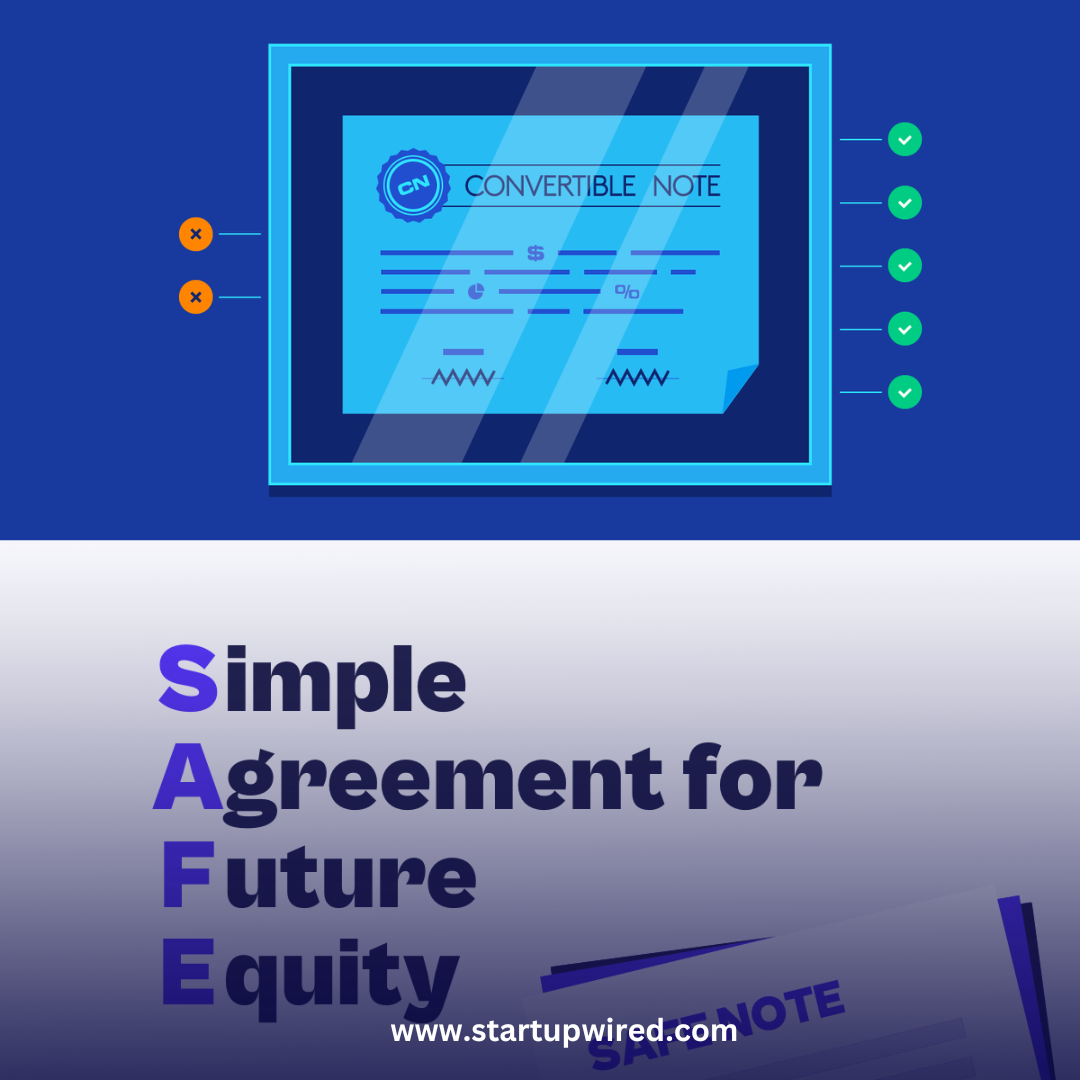Raising capital challenges every startup founder. Early-stage companies often lack revenue, making traditional equity financing difficult. To overcome this, founders turn to convertible notes and Simple Agreements for Future Equity (SAFEs). These instruments help startups secure funding without setting an immediate valuation. While both serve similar purposes, they operate differently. Founders must understand these differences to make informed fundraising decisions.
Understanding Convertible Notes
Convertible notes function as short-term debt instruments that convert into equity during a future financing round. Investors provide capital with the expectation of receiving equity rather than cash repayment. Startups use this funding to reach key milestones before securing venture capital.
Key Features of Convertible Notes
- Debt Instrument: Convertible notes begin as loans with an obligation to repay under specific conditions.
- Maturity Date: Founders must repay the note or convert it into equity before a deadline.
- Interest Rate: Investors earn interest, increasing the final conversion amount.
- Discount Rate: Investors receive shares at a discount compared to new investors in the next financing round.
- Valuation Cap: A ceiling on the company’s valuation ensures early investors receive a fair equity share upon conversion.
Convertible notes offer investors downside protection due to their debt status. If a startup fails, investors may claim remaining assets before common shareholders.
How Convertible Notes Work
A founder raises capital using convertible notes, agreeing to specific terms with investors. If the startup secures an equity financing round, the note converts into preferred stock at a discounted rate or valuation cap. If no financing occurs, the startup must either repay the note with interest or renegotiate terms. The process creates a structured approach to early-stage funding, aligning incentives between founders and investors.
Understanding SAFEs
SAFEs provide an alternative to convertible notes by eliminating debt elements. Introduced by Y Combinator in 2013, SAFEs simplify early-stage funding. Unlike convertible notes, they do not include repayment obligations or interest accrual.
Key Features of SAFEs
- Equity Agreement: SAFEs represent an agreement for future equity rather than debt.
- No Maturity Date: Investors hold SAFEs indefinitely until a conversion event occurs.
- No Interest Rate: Since SAFEs do not classify as loans, no interest accumulates.
- Discount Rate: Investors often receive a discounted share price during the next financing round.
- Valuation Cap: Like convertible notes, SAFEs may include a valuation cap to protect early investors.
Startups prefer SAFEs because they avoid the complexities of debt management. Investors accept the structure since it offers potential equity upside without fixed repayment obligations.
How SAFEs Work
A founder issues SAFEs to investors in exchange for capital. The agreement states that investors will receive shares at a future equity financing event. Since no repayment obligation exists, founders avoid debt pressure. When the startup raises its next round, the SAFE converts into preferred shares based on pre-agreed terms.
Key Differences Between Convertible Notes and SAFEs
Both instruments facilitate early-stage funding, but their structures differ significantly. Understanding these differences ensures founders choose the right financing tool.
1. Legal Classification
- Convertible Notes: Classified as debt until conversion.
- SAFEs: Considered an investment agreement rather than a loan.
2. Maturity and Repayment
- Convertible Notes: Require repayment or conversion by a specified date.
- SAFEs: No maturity date; conversion occurs when an equity event happens.
3. Interest Accrual
- Convertible Notes: Accumulate interest over time.
- SAFEs: Do not involve interest payments.
4. Investor Protection
- Convertible Notes: Provide investors with repayment priority in case of liquidation.
- SAFEs: Offer fewer protections since they do not constitute debt.
5. Simplicity
- Convertible Notes: Require detailed terms, including interest rates and maturity dates.
- SAFEs: Simpler agreements that avoid debt structuring.
Pros and Cons of Convertible Notes
Pros
- Investor Protection: Lenders have priority in case of company liquidation.
- Proven Structure: VCs and angel investors understand and accept convertible notes.
- Flexible Valuation: Allows startups to delay valuation decisions until a priced round.
Cons
- Debt Burden: Startups face repayment risks if no conversion occurs.
- Interest Costs: Accruing interest increases the conversion price.
- Negotiation Complexity: Requires setting terms such as maturity dates and interest rates.
Pros and Cons of SAFEs
Pros
- Founder-Friendly: No repayment risk or interest accumulation.
- Simple Agreements: Easier to execute with fewer legal complications.
- No Debt Pressure: Founders can focus on growth without financial stress.
Cons
- Investor Risk: Investors hold less protection compared to convertible notes.
- Uncertain Timing: No maturity date means investors may wait longer for conversion.
- Limited Adoption: Some investors hesitate to use SAFEs due to uncertain exit timelines.
When to Use Convertible Notes vs. SAFEs
When to Use Convertible Notes
- If investors prefer a structured debt instrument.
- When startups anticipate a clear funding timeline.
- If founders need additional leverage in negotiations.
- When securing funding from investors who favor traditional debt-based instruments.
When to Use SAFEs
- If founders want a simpler fundraising process.
- When the startup operates in an early stage without predictable financing rounds.
- If avoiding debt obligations provides strategic benefits.
- When raising capital from accelerators or investors familiar with SAFEs.
Legal Considerations and Negotiation Strategies
Founders must work with experienced legal counsel when structuring convertible notes or SAFEs. Understanding investor preferences and industry norms ensures smoother negotiations. Key considerations include:
- Valuation Caps: Setting reasonable caps prevents excessive dilution.
- Discount Rates: Offering fair discounts attracts investors without undervaluing equity.
- Clear Terms: Transparent agreements prevent future disputes.
- Future Fundraising Plans: Aligning funding strategy with business growth minimizes risks.
Final Thoughts
Convertible notes and SAFEs both serve as effective tools for startup financing. Each carries unique advantages and drawbacks. Founders must evaluate their company’s funding needs, investor preferences, and long-term goals before deciding. By understanding the fundamental differences, founders can structure their fundraising efforts to maximize capital while protecting equity. Seeking guidance from legal and financial experts ensures a balanced approach, ultimately positioning the startup for future success.
